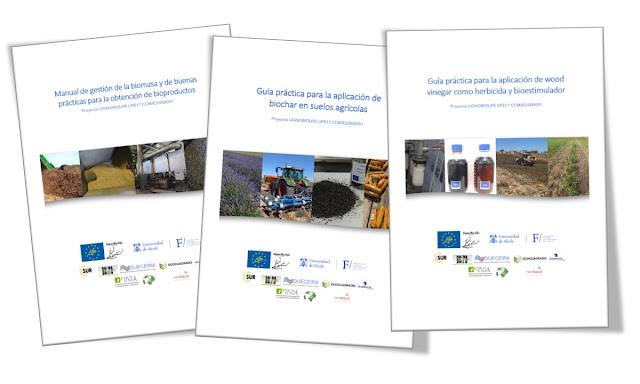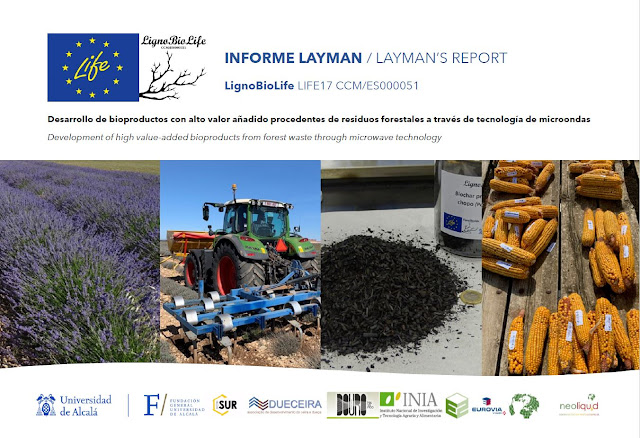LignoBioLife project is full running
The LignoBioLife Project is in full swing to put on the market a natural herbicide, a fertilizer and asphalt material, all from agricultural and forestry residues.
With a budget of 1.3 million euros, a total of 8 partners from Spain and Portugal participate in this LIFE project in the area of climate change, including the Portuguese Local Action Groups Douro and Dueceira
The ultimate objective is to promote the creation of bio-refineries that put these bio-natural products on the market, useful for pest control, agriculture and more sustainable works.
The Department of Environment of the General Foundation of the University of Alcalá is a European referrer in the research and application of wood vinegar as a natural herbicide to replace others with glyphosate content, which is increasingly rejected on an international level. Now, this project will also study the applications of two other products: biochar and bio-bitumen, also coming from agricultural and forestry wood residues. In the first case, it is intended to demonstrate the effectiveness of biochar as a product improvement of cultivated soils which also has a great effect as a carbon sink and, in the case of bio-bitumen, its usefulness as a natural bitumen for asphalt.
This demonstration project will last until 2022 and, when it is finished, will have used a total of 52 tons of wood residues of agricultural and forestry plantations, converted into bio-products. Three Local Action Groups from Spain and Portugal will be in charge of collecting and supplying forest residues which, in no case, will come from native forests. An expert company in forest residues will take care of the transformation of these prunings into the three bio-products and the University of Alcalá, in collaboration with the INIA (National Institute for Agricultural Research), will carry out technical tests for quality control.
The bio-products will be applied thanks to the collaboration of the Local Action Groups which, in the case of Spain, is located in Mondéjar, in the province of Guadalajara. It will be in this environment where both wood vinegar and biochar are used, on vineyards and olive trees, in collaboration with local farmers, as well as in northern and central Portugal. "It is about using forest residues from reforestation or agricultural plants, avoiding in any case the use of material from native forests. In fact, in Portugal they will use remains of wood from the manufacture of chestnut and oak wine barrels that are currently not used". In the case of Guadalajara, we will work with the remains of the pruning of vines and olive trees", points out Juan Luis Aguirre, Director of the Department of Environment of FGUA. Both products will also be tested on INIA plots. On the other hand, the multinational company Eurovías will use the bio-bitumen for producing asphalt.
The partners of this LIFE project will verify the level of efficiency of these three products in these areas of experimentation and, if as expected, the results are positive, they will have to make every effort to convince the private company about the environmental and economic profitability of producing and commercializing this type of products, because the ultimate goal is the start-up of 3 bio-refineries in the 3 target areas of the project: Guadalajara, northern and central Portugal.
"It is about making an industrial development from beginning to end and offering the market clean technologies with the use of bio-products from waste that otherwise end up burning and generating CO2" says the Director of the Department of the Environment of FGUA, who also explains that "we are already with the first half-scale tests. The most positive thing is that much of the previous work is already done. Now the LIFE Program will show that it is profitable. In fact, one of the partner companies is going to carry out an eco-financial study to measure viability."
The University of Alcalá is a referrer in the research of wood vinegar as a substitute for glyphosate, a herbicidal substance widely used in the world and which, according to various studies, is very harmful to health. Looking for alternatives to this herbicidal substance, the Department of Environment of FGUA has carried out tests on roads of the region of Castilla-La Mancha with very satisfactory results. According to Aguirre, "it is urgent to take measures to reduce the use of glyphosate and also link it to the development of rural areas with abundant lignocellulosic residues."



